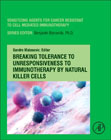
Breaking Tolerance to Unresponsiveness to Immunotherapy by Natural Killer Cells
Matosevic, Sandro
Breaking Tolerance to Unresponsiveness to Immunotherapy by Natural Killer Cells presents a collection of chapters by leaders in translational natural killer cell research and bridges the gap between clinical need and basic science by presenting the state-of-the-art of our knowledge in innate immunity and the challenges associated with translating it to practical adoptive immunotherapies. The highly translational aspect of this book guides the reader in understanding the use of human-derived natural killer cells, and their behavior in the context of difficult tumors that are as-yet untreatable. New approaches, such as the genetic engineering of NK cells and their combination with checkpoint blockade therapies, are discussed among other potential interventions to improve natural killer cell function against targets. This highlights challenges, such as the difficulty in genetically modifying NK cells or a poor understanding of their effect on checkpoint inhibition, which guide reader-researchers in deepening their understanding of this important new treatment modality. The book is a key reference and go-to resource for researchers and clinicians to understand the current limitations associated with bringing natural killer cell-based immunotherapies to the clinic. Discusses translational aspects of the topic from leaders in the field to facilitate readers' understanding of clinical challengesAddresses important events that occur in patient tumor microenvironment as they pertain to NK cells and how they are or can be tackled to overcome immunosuppression of NK cellsFocuses on immunometabolism by discussing the metabolic reprogramming that NK cells undergo in solid tumors: hypoxia, adenosine, and other metabolites and their effects on NK cells INDICE: 1. Expanding the persistence of adoptively-transferred NK cells: cytokine priming and epigenetic imprintingAdelheid Cerwenka, The Medical Faculty Mannheim of the University of Heidelberg 2. Targeting purinergic signaling to improve natural killer cells immunotherapy of solid tumorsMark Smyth, QIMR Berghofer3. Genetic engineering of CD19-targeted chimeric antigen-receptor NK cells derived from cord blood as clinical treatment for immunotherapy of B cell lymphomaKaty Rezvani, MD Anderson Cancer Center4. New sources of functionally-mature NK cells: peripheral blood-derived induced pluripotent stem cellsShu Wang, National University of Singapore5. The contribution of natural killer cells to immunotherapy with PD-1/PD-L1 checkpoint blockadeMichele Ardolino, University of Ottawa6. Molecular checkpoints controlling NK cell activation and anti-tumor immunityHun Sik Kim, University of Ulsan College of Medicine7. Exploiting hypoxia's role in driving functional responses by IL-15-primed NK cells to target solid tumorsHolger Lindner, Heidelberg University8. Metabolic reprogramming and the role of mTOR in driving NK cell anti-tumor immunityAndreas Lundqvist, Karolinska Institutet9. Allo-reactive NK cells in immunotherapy of lung cancer: a clinical perspectiveJiuwei Cui, First Hospital of Jilin University10. Control of tumor metastasis by NK cellsLorenzo Galluzzi, Weil Cornell Medical College11. Challenges and opportunities with NK cells in the clinical treatment of acute myeloid leukemiaRizwan Romee, Dana Farber Cancer Institute
- ISBN: 978-0-12-820627-0
- Editorial: Academic Press
- Encuadernacion: Cartoné
- Páginas: 200
- Fecha Publicación: 01/08/2020
- Nº Volúmenes: 1
- Idioma: Inglés
